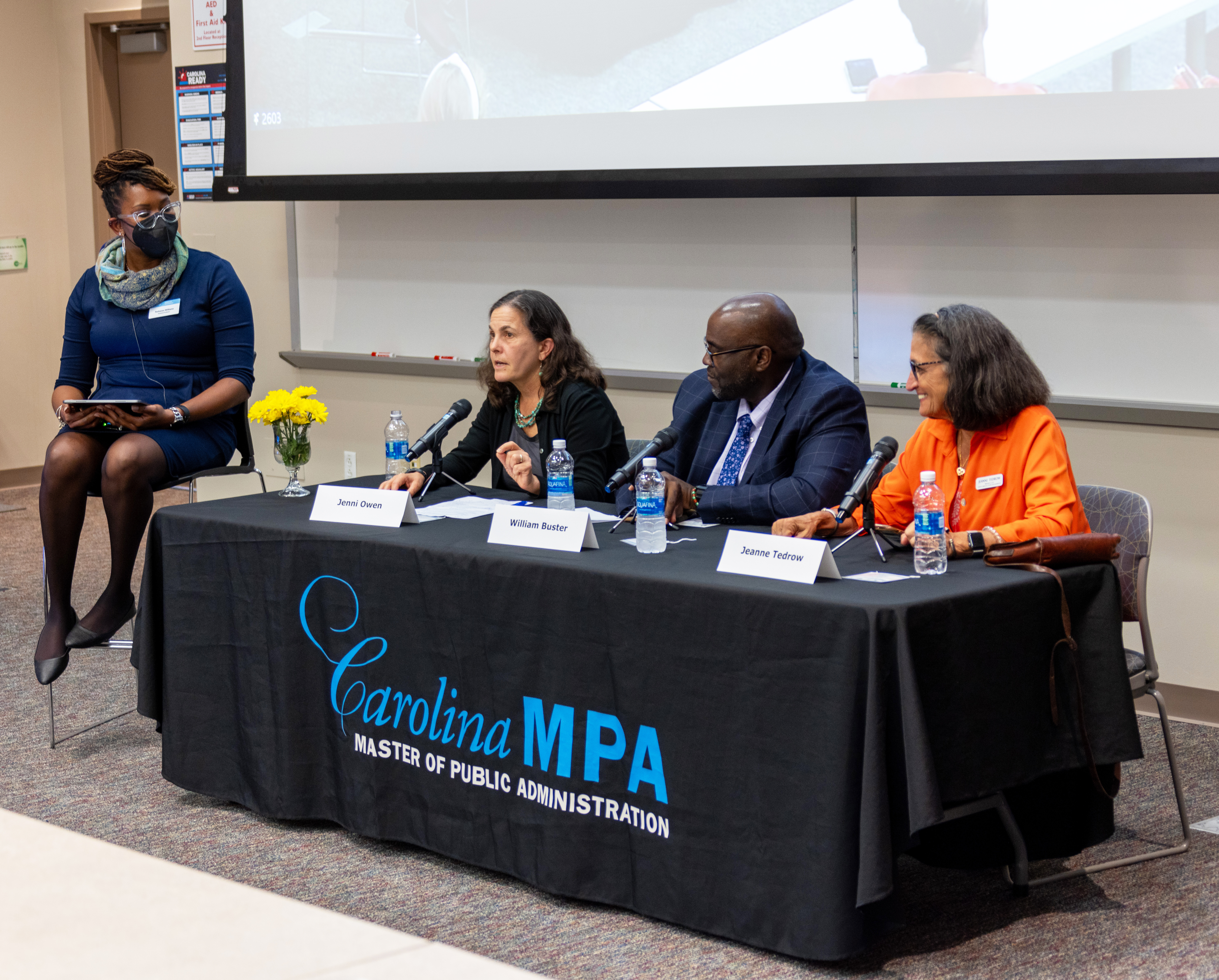Panelists Discuss Public Sector Issues in 2023 Deil S. Wright Public Service Forum
UNC MPA faculty, staff, and alumni gathered at the School of Government on Friday, September 29 to hear speakers at the Deil S. Wright Public Service Forum. The forum's topic was the role philanthropy, nonprofits, and governments play in responding to issues those working in public service address daily.
In 2002, the UNC MPA Alumni Association honored Professor Deil Wright for his 34 years of teaching MPA students by creating the Deil S. Wright Lecture in Public Administration. Each year, a distinguished professional from the field of public administration enriches the educational experience of students, alumni, faculty, and interested members of the community through this lecture. This year, the MPA program piloted a new format for the event and invited multiple speakers to participate in a panel discussion. The new format aims to improve the integration of subject matter within the concurrent MPA Immersion course by fostering deeper discussions of the material.
The esteemed panel of speakers consisted of:
Jeanne Tedrow, President and CEO of the North Carolina Center for Nonprofits
William Buster, President and CEO of the New Hanover Community Endowment
Jenni Owen, Director of NC Office of Strategic Partnerships
Much of the conversation revolved around the tension nonprofit organizations face in fulfilling their mission while balancing their business needs. “Many small organizations don’t have the capacity to grow in the ways they envision themselves as liking to grow,” said Jeanne Tedrow. “We need to be able to meet them where they are to help them grow.” She described how her organization, the North Carolina Center for Nonprofits, finds ways to help nonprofits assess their needs and supports them in building capacity in a way that feels empowering for the leadership of the organizations.
“The problem from my perspective,” William Buster added, “is that we ask nonprofits to solve the big problems our society doesn’t know what to do with, and we don’t give them the resources to do that.”Buster discussed the role of philanthropy in supporting and advocating for nonprofits, especially when they may not be able to do so themselves. “Philanthropy, at its best, can convene, push, and ask questions others can’t ask. We can be the voice in the room for nonprofits when they are not included.” He also spoke to the importance of engaging in conversations to think differently about how to solve these problems, convening partners to help tap additional resources (such as different types of funding), and encouraging collaboration.
Each panelist addressed the need for knowledge sharing amongst nonprofit organizations, which often feel they are in competition with others for resources such as funding. “There’s no way problems will be solved by one organization alone,” said Tedrow. “We need to communicate across sectors. I would like to see the nonprofit sector recognized as a true, valuable partner. We are often undervalued in the role that we play.” She pointed out that collaboration between nonprofits requires a lot of resources and that often, the support of a funder who will support the work is necessary for it to happen.
Jenni Owen focused on research's important role in addressing issues across sectors. “Research institutions can benefit all the other sectors. Research says, ‘the thing that I am doing is more likely to have an impact than another thing,’" said Owen.
Research helps governmental, nonprofit, and philanthropic organizations share knowledge and back up their approaches to solving problems. “What our office does is try to leverage the expertise we have in North Carolina in colleges and philanthropic organizations. The barriers we try to mitigate are barriers between sectors that keep us from doing the best work we can do.”
Owen pointed out that the government has substantial convening power, but that open communication across sectors is paramount even when you can get organizations together. She advised building relationships between organizations before they are truly needed to facilitate easier communication. “Too much investment goes into all of our sectors to not be sharing knowledge across them,” she said.
The panelists shared valuable insights into issues public sector organizations face and how they tackle them. The event inspired engaging conversations, which continued into fellowship at the reception for attendees afterward.
A recording of the lecture can be viewed at the following link: Link to Wright Public Service Forum recording.
Published October 5, 2023



